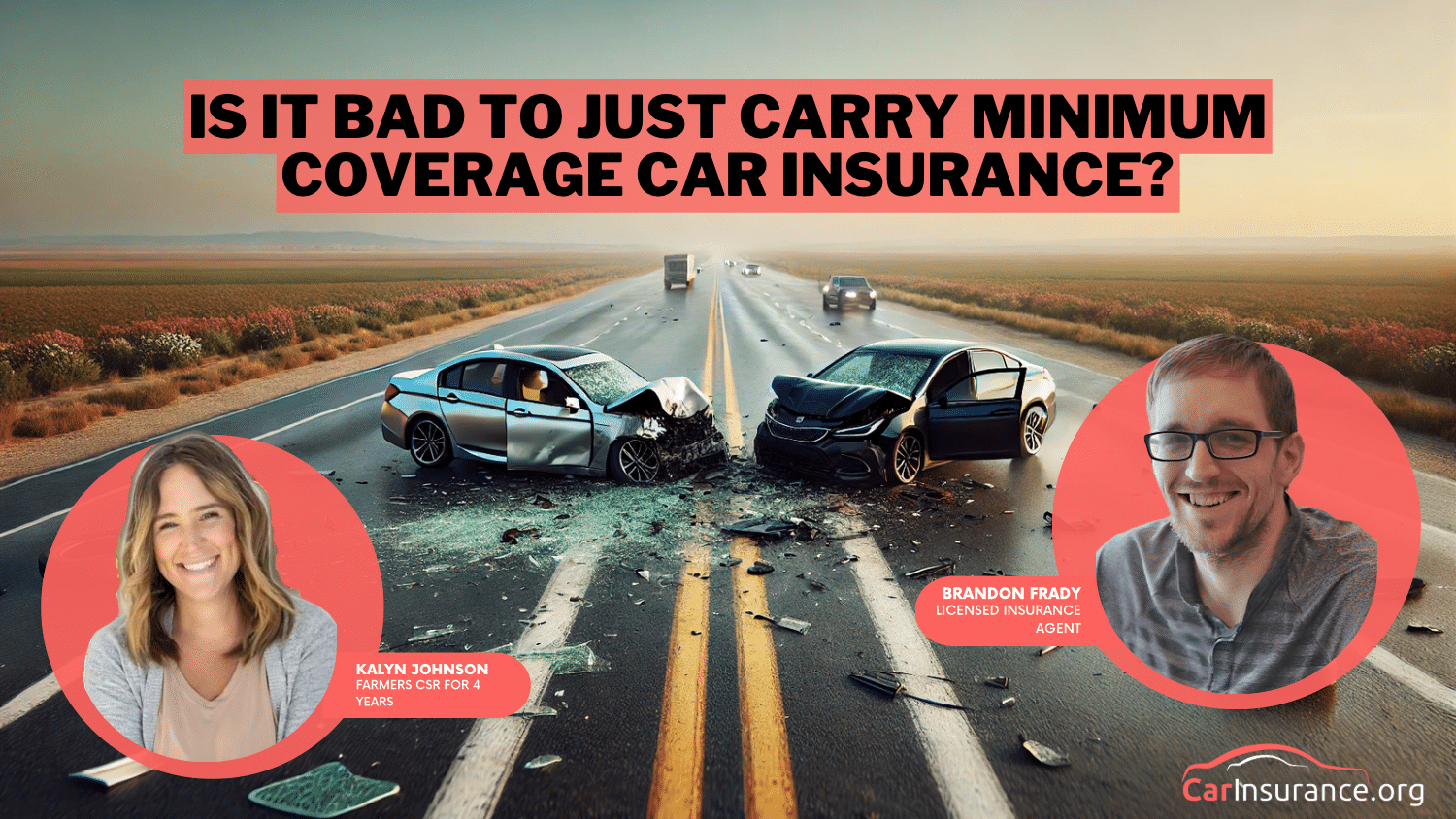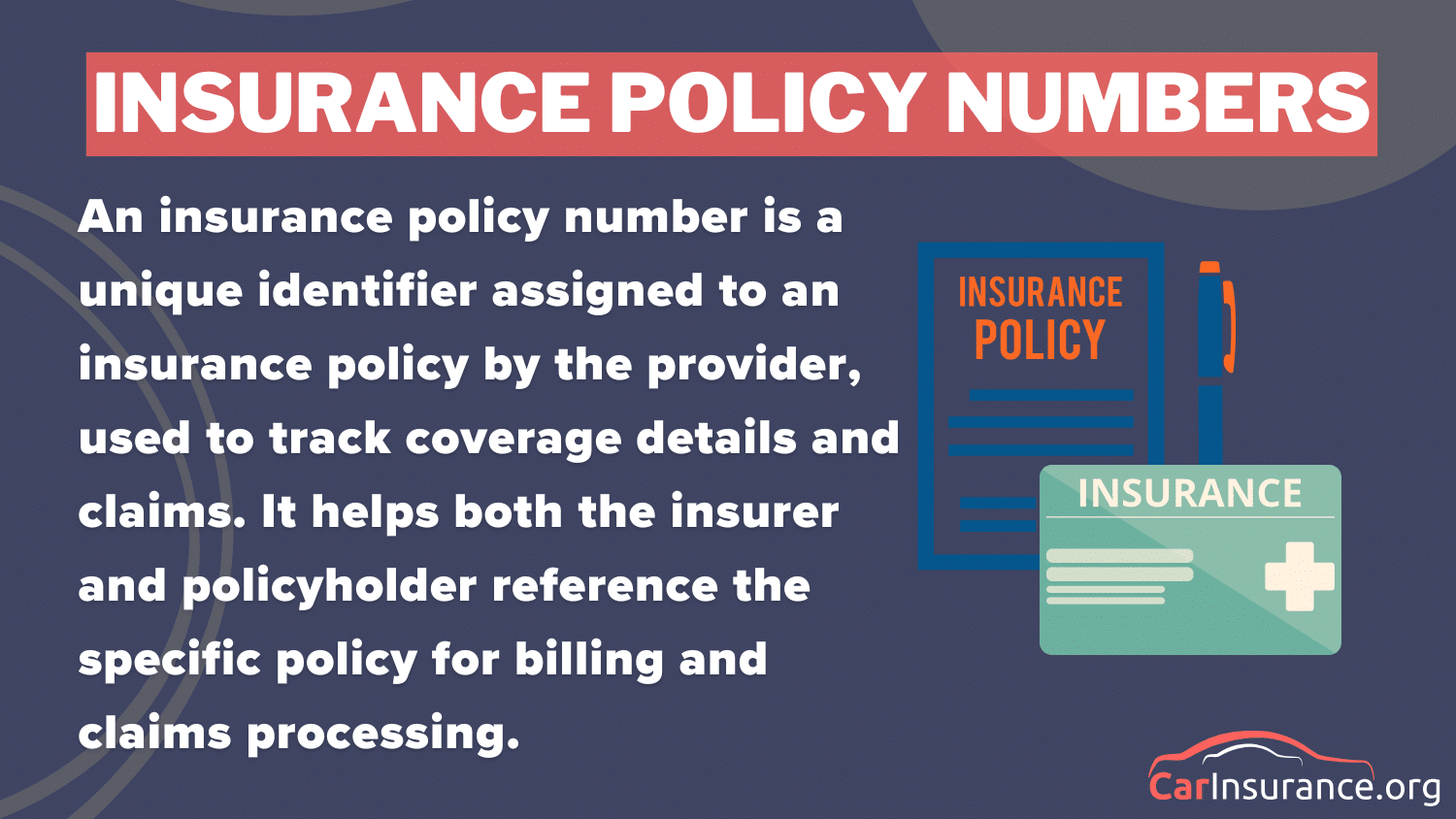Can you insure a car that is not in your name?
You can insure a car that is not in your name if you have an insurable interest in the vehicle. Usually this means that you have a vested interest in keeping the car in good working order and avoiding accidents. Your best option may be to get a non-owner car insurance policy.
Read more Secured with SHA-256 Encryption




Table of Contents
Table of Contents


Licensed Insurance Agent
Scott W Johnson is an independent insurance agent in California. Principal Broker and founder of Marindependent Insurance Services, Scott brings over 25 years of experience to his clients. His Five President’s Council awards prove he uses all he learned at Avocet, Sprint Nextel, and Farmers Insurance to the benefit of his clients. Scott quickly grasped the unique insurance requirements of his...
Scott W. Johnson


Licensed Insurance Agent
Brad Larson has been in the insurance industry for over 16 years. He specializes in helping clients navigate the claims process, with a particular emphasis on coverage analysis. He received his bachelor’s degree from the University of Utah in Political Science. He also holds an Associate in Claims (AIC) and Associate in General Insurance (AINS) designations, as well as a Utah Property and Casual...
Brad Larson
Updated July 2024
- If you want to insure a car that is not in your name, you first have to show your insurance company that you have an insurable interest in the vehicle
- Alternatively, you can get added as a named driver on the owner’s insurance policy or obtain a co-ownership agreement for the vehicle
- There’s also non-owner insurance, which is ideal for drivers who frequently rent or borrow cars
Can you insure a car you don’t own? The short answer is yes, but not without difficulty.
In theory, it should be easy, as you simply tell the insurance company that you’re not the owner when you apply. In practice, however, the process can be a little frustrating.
The problem is that most car insurance companies are generally reluctant to insure someone who isn’t the owner of the car. This is due to something called insurable interest, which forms the basis of all insurance contracts. Continue reading to find out what it takes to insure a car that you don’t own.
Insurable Interest Explained
The basic assumption behind insurable interest is that if you obtain car insurance for your own vehicle, you have a vested interest in its well-being. The majority of car owners wouldn’t want to damage their vehicle because of the repair costs and the risk of losing a substantial investment. Furthermore, insurers only want to insure drivers who have obvious reasons for using and caring for a vehicle.
But for an insurance company, all this intrinsic motivation to keep your car accident-free is gone when you’re not the owner. In their eyes, the car simply isn’t important to you. After all, it won’t matter if you total a car that you don’t own.
Free Insurance Comparison
Compare Quotes From Top Companies and Save
Secured with SHA-256 Encryption
Understanding Non-Owner and No-License Car Insurance: Essential Information and Key Providers
Navigating car insurance options can be challenging, especially if you don’t own a vehicle or don’t have a driver’s license. Understanding policies like no-license car insurance and non-owner car insurance can help you stay protected in various driving situations.
In this guide, we’ll explore key providers such as Farmers and Progressive, outline Texas’s required car insurance, and explain the importance of insurable interest for vehicle owners and co-owners.
No-License Car Insurance
If you don’t have a driver’s license, it is still possible to obtain car insurance in certain circumstances. No-license car insurance is designed for individuals who own a car but do not drive it themselves. This type of insurance can be particularly useful for individuals who have a chauffeur or a designated driver. Check with various insurance providers to see if they offer this type of policy and what their specific requirements are.
Non-Owner Car Insurance from Farmers
Non-owner car insurance from Farmers is an excellent option for those who frequently drive cars they don’t own. This type of policy provides liability coverage for drivers who borrow or rent cars. It can be a cost-effective way to ensure you are protected when driving vehicles that are not registered in your name.
Non-Owner Car Insurance with Progressive
Progressive provides non-owner car insurance for those who require coverage when driving cars they don’t own. This type of policy usually includes liability coverage, which protects you if you’re responsible for an accident. It’s perfect for people who frequently rent cars or borrow vehicles from friends or family. A non-owners car insurance from Progressive offers liability coverage for drivers without a car who still need insurance. This coverage is essential for individuals who regularly drive rental or borrowed cars, ensuring protection against potential liabilities.
Brad Larson at State Farm
State Farm, represented by Brad Larson, offers a variety of car insurance options tailored to meet the needs of different drivers. Whether you’re looking for basic liability coverage or more comprehensive policies, State Farm can provide personalized solutions to fit your situation. Brad Larson can help you navigate the options and find the best coverage for your needs.
Required car insurance in Texas
In Texas, car insurance is mandatory for all drivers. The Required car insurance in Texas includes liability coverage to cover bodily injury and property damage in the event of an accident. It is essential to understand the minimum coverage requirements and ensure that your policy meets these standards to avoid penalties and legal issues.
The Owner/Co-Owner Selected May Not Have an Insurable Interest in the Vehicle
When selecting an insurance policy, it’s crucial to ensure that the owner or co-owner of the vehicle has an insurable interest. This means that the person would suffer a financial loss if the vehicle were damaged or stolen. Without an insurable interest, the insurance company may deny coverage. Always verify that the owner or co-owner meets this requirement to avoid complications with your policy.
How to Insure a Car You Don’t Own
In order to obtain insurance for a car you don’t own, you’ll need to convince insurance companies of your involvement in the car’s ownership. It is up to you to demonstrate that you are just as invested in the car as the owner is.
Here are some ways to acquire insurance for a car you don’t own:
- Add the owner to your policy as an additional interest
- Get added to the owner’s policy
- Get a non-owners insurance policy
- Add your name to the car’s registration
The effectiveness of each method varies depending on your situation. We’ll review all the available options, so that you can choose the one that best fits your needs.
Include the Owner in Your Policy as an Additional Interest
If you already have an existing insurance policy in your name, simply add the owner of the vehicle as an additional interest. Vehicle owners added as additional interests still retain ownership of their vehicles, even if they are not the primary drivers. (For more information, read our “Auto-Owners Car Insurance Review“).
As opposed to adding another covered driver, this will not affect your insurance rates. It merely indicates that another party has an insurable interest. We recommend this option if the vehicle is in your possession more than the owner’s and you need regular access to it.
Just remember that, in order for the owner to drive the vehicle, they will still need to obtain their own insurance as they are not covered by your policy.
Add Yourself to the Owner’s Policy
Additionally, you can add yourself as a named driver to the original owner’s insurance policy. You’ll be able to do this easily if you live in the same house as the owner. However, expect increased insurance rates, though it is still generally more affordable than having separate policies for each driver.
If you do not live with the owner, your insurer may be less willing to give you some wiggle room in regard to adding names to the policy. In this situation, as mentioned above, you will need to prove that you have a financial interest in the car.
For example, you might say that you need to use a vehicle to commute to work but cannot afford your own car. This is a perfectly valid reason.
Just remember to be honest. Getting caught lying to your insurance provider can lead to rate increases, policy rejections, and fines.
Get a Non-Owner Insurance Policy
Some companies offer special insurance policies that allow you to insure a car that’s not yours. We call these non-owner policies.
Non-owner car insurance is for people who don’t own a car but occasionally drive someone else’s. This type of insurance provides liability coverage for you, but the vehicle itself still has to be insured by the owner.
Non-owner insurance is best if you regularly borrow cars from family or friends. It’s also a suitable option if you regularly rent cars or use car-sharing services. This type of coverage is designed to complement the owner’s existing policy rather than replace it, so it can be purchased whenever needed.
Rates for non-owner auto insurance tend to be between 5% and 15% lower than standard policies. However, if you drive a borrowed or rented car only a few times a month, the savings may not be noticeable. On the other hand, if you will be driving the car often, it makes sense to add yourself to the owner’s policy instead (see the previous method).
Most of the major car insurance companies offer non-owner car insurance, so if you want to insure a car you don’t own with State Farm, Geico, or Allstate, for instance, you have the option. Progressive will also insure a car that is not in your name if you buy non-owner car insurance.
Add Your Name to the Car’s Registration
A co-owner agreement is another simple way to prove that you have an insurable interest in a car that you don’t own by directly sharing ownership of it. To register yourself as a co-owner of a vehicle, speak to the owner about obtaining a new registration. Otherwise, if the car is intended as a gift, have the owner directly transfer the registration to you.
Both of these processes must be done at your state’s Department of Motor Vehicles (DMV) and will require a new registration for the vehicle. (For more information, read our “Does your car insurance and registration have to be under the same name?“).
In any case, once your name appears on the title of the car, acquiring insurance for that vehicle won’t be difficult. However, keep in mind that you’re technically insuring your own vehicle at this point.
Regardless, in the event that you decide to pursue this route, here are a few other situations to consider:
- It can be challenging to obtain co-ownership of a vehicle in certain circumstances, such as when the vehicle has yet to be fully paid off
- You can acquire a co-owner even if you don’t live together
- State regulations may vary regarding transferring or altering registrations
Insuring a Car Not in Your Name: Understanding Non-Owner Car Insurance
Insuring a car not in your name can be a complex issue, but non-owner car insurance offers a practical solution. This type of policy provides liability coverage for individuals who drive cars they do not own, ensuring they are protected in case of an accident. Whether you’re borrowing a friend’s car or renting one, understanding non-owner car insurance is essential for staying protected and compliant with state laws.
This guide will help you navigate the intricacies of non-owner car insurance, its benefits, and how it can provide peace of mind on the road.
What is Non-Owner Car Insurance?
Non-owner car insurance provides coverage for individuals who frequently drive but do not own a vehicle. It’s designed for renters, those who borrow cars occasionally, or individuals who rely on ride-sharing services.
Key Considerations for Non-Owner Car Insurance
When considering non-owner car insurance, several factors and considerations come into play:
Coverage Providers and Options
- Farmers Insurance: Offers non-owner car insurance policies tailored to drivers without a vehicle.
- Progressive: Provides non-owner car insurance options, ideal for those who rent cars frequently.
- State Farm: Offers coverage options, including insights from Brad Larson, focused on non-owner policies.
Policy Specifics
- Geico Named Non-Owner Policy: A specific type of non-owner policy from GEICO.
- Progressive Non-Owner Car Insurance: Details on Progressive’s offerings for non-owners.
- Farmers Insurance Non-Owner Car Insurance: Insights into coverage provided by Farmers Insurance.
Legal and Coverage Requirements
- Texas Insurance Requirements: Understanding mandatory insurance requirements in Texas.
- Non-Owner Car Insurance in New York: Specifics on coverage options available in New York.
- Non-Owners Car Insurance in NC: Coverage details and legal requirements in North Carolina.
Insurable Interest
- Insurable Interest in Auto Insurance: Exploring the concept of insurable interest and its relevance.
- Insurance on a Vehicle Not in Your Name: Addressing how to insure a car that you do not own.
Additional Considerations
- Telematics and Usage-Based Insurance: How telematics impact non-owner car insurance policies.
- Rental Cars in Cleburne, TX: Insights into securing rental cars and insurance specifics in Cleburne, TX.
- Secured Car Brokers: Exploring resources for securing non-owner car insurance through reputable brokers.
By understanding these nuances, individuals can navigate the complexities of non-owner car insurance, ensuring adequate coverage and compliance with state regulations, like those in Texas and New York, while addressing unique situations such as insuring a vehicle not registered in their name.
Free Insurance Comparison
Compare Quotes From Top Companies and Save
Secured with SHA-256 Encryption
Insuring a Vehicle Not in Your Name
When dealing with auto insurance, one common query is how to insure a vehicle not in your name. This situation often arises when a person needs to cover a car they drive but do not own. Insuring a vehicle not in your name can be a bit more complex, as insurance companies typically prefer the policyholder to have an ownership interest in the vehicle. However, many insurers, including the Countrywide Insurance Company, offer solutions for such scenarios. It’s essential to contact the insurance provider directly to understand their specific requirements and policies related to insuring a vehicle not in your name.
The Countrywide Insurance Company, for instance, may have special provisions for individuals who need to insure a car that is registered to someone else. In these cases, the insurance company might require additional documentation or have specific criteria that need to be met. It’s crucial to provide accurate information about your situation and the vehicle in question to ensure you receive appropriate coverage. If you’re in a situation where you need to insure a vehicle not in your name, reaching out to a representative from the Countrywide Insurance Company can help clarify your options and ensure that you are adequately covered.
Insuring a Vehicle You Don’t Own: A Comprehensive Guide
Insuring a Vehicle You Don’t Own can be a complex but essential process, especially if you frequently drive or use a car that isn’t registered in your name. Understanding insurable interest and non-owner car insurance options is crucial to ensuring you have the necessary coverage. Here’s a comprehensive guide to help you navigate this topic effectively.
Understanding Insurable Interest and Non-Owner Car Insurance
When it comes to insuring a vehicle that isn’t registered in your name, understanding insurable interest is crucial. Here’s a step-by-step guide to navigate through the process:
What is Insurable Interest? Insurable interest refers to the financial stake you have in a vehicle, which allows you to insure it. Typically, owners or co-owners have an insurable interest in the vehicle. Securing insurance on a car that is not in your name can present unique challenges and considerations. This situation often arises when a driver needs coverage for a vehicle they do not own, whether it’s a rental, a car used by a family member, or a vehicle borrowed from a friend. Many insurance companies offer specific policies designed for these scenarios, such as non-owner car insurance or named non-owner policies. These policies can provide the necessary coverage while ensuring that you are protected against potential liabilities.
Non-Owner Car Insurance Explained: Non-owner car insurance provides coverage for drivers who don’t own a vehicle but need liability insurance. This type of insurance is useful for those who frequently rent cars or borrow vehicles.
Key Providers Offering Non-Owner Car Insurance
Farmers Insurance and Progressive offer non-owner car insurance policies tailored to meet different needs, including coverage in various states like Texas.
- Farmers Telematics Insurance: Farmers Insurance provides non-owner car insurance with options for telematics, allowing for usage-based insurance premiums.
- Progressive Non-Owner Auto Insurance: Progressive also offers non-owner auto insurance policies, which can be customized based on individual driving habits and needs.
Texas-Specific Requirements: In Texas, non-owner car insurance must meet specific state requirements. This includes coverage levels mandated by law and ensuring compliance with Texas’s blue title requirements.
State Farm and Brad Larson’s Expertise: State Farm, with advisors like Brad Larson, offers insights into insurable interest and non-owner policies, ensuring clients understand their coverage options fully.
Named Non-Owner Auto Insurance: Named non-owner auto insurance policies allow you to designate specific coverage for vehicles you frequently use but do not own, providing tailored protection.
Navigating No-License and Non-Owner Insurance: Even without a driver’s license, you may be able to obtain non-owner car insurance, depending on the insurer’s policies and state regulations.
By understanding these concepts and policies, you can make informed decisions about insuring vehicles not in your name, ensuring you have the right coverage for your driving needs while complying with legal requirements.
Understanding Non-Owner Car Insurance in Texas
When it comes to car insurance in Texas, particularly for vehicles not owned by the policyholder, understanding the concept of insurable interest and the options available is crucial. Here’s a breakdown of key considerations and steps:
Insurable interest in car insurance refers to the financial stake or relationship that an insurance policyholder has in the insured item, which in this case, is the vehicle. It typically means the policyholder benefits from the continued existence and good condition of the vehicle or would suffer a financial loss if the vehicle is damaged or lost.
Steps to Insure a Car Not in Your Name
-
Evaluate Non-Owner Car Insurance Policies: Non-owner car insurance is designed for individuals who frequently drive but do not own a vehicle. It provides liability coverage when renting or borrowing a car.
-
Comparison of Policies: Compare non-owner car insurance options from providers like Farmers and Progressive. Each may offer different coverage limits, rates, and additional benefits.
-
Requirements in Texas: In Texas, insurance requirements mandate liability coverage for drivers. Non-owner car insurance fulfills this requirement when driving vehicles not owned by the policyholder.
-
Consultation with Agents: Discuss specific needs with insurance agents such as Brad Larson at State Farm. They can provide tailored advice on obtaining non-owner coverage that meets legal and personal protection needs.
-
Understanding Documentation: Familiarize yourself with Texas blue title requirements and proof of insurance documents necessary for registration and legal compliance.
-
Policy Considerations: Ensure the policy addresses potential scenarios outlined in Progressive non-owners auto insurance policy, including coverage limits and optional features like roadside assistance.
By following these steps and understanding the nuances of non-owner car insurance in Texas, individuals can confidently insure vehicles not registered in their names while meeting legal obligations and protecting against unforeseen liabilities.
Free Insurance Comparison
Compare Quotes From Top Companies and Save
Secured with SHA-256 Encryption
Are there any legal restrictions?
New York is the only state in the U.S. that requires that the name on the insurance card match the name on the vehicle’s registration.
This indicates that a driver in New York cannot obtain insurance for a car they do not own. The state does, however, allow co-ownership. So, as long as you are listed as a co-owner on the vehicle’s registration, you can still go ahead and purchase coverage for your vehicle.
You can insure a car you don’t own in Texas, Florida, and all other states in the ways stipulated above.
Frequently Asked Questions
Can I add a car to my insurance that is not in my name?
Yes, you can add a car to your insurance that is not in your name if you can demonstrate insurable interest in the vehicle.
Can you insure a car that is not registered to you?
Yes, you can insure a car that is not registered to you if you have a valid reason and can show insurable interest.
Can you insure a car that is not titled in your name?
Yes, you can insure a car that is not titled in your name if you have insurable interest in the vehicle.
Can you insure a car that is not yours?
Yes, you can insure a car that is not technically yours if you can prove you have a financial stake or need for coverage.
Do you need to have a license to get car insurance?
Yes, typically you need a valid driver’s license to obtain car insurance coverage.
Do you need to own a car to insure it?
No, you do not necessarily need to own a car to insure it, but you must have insurable interest in the vehicle.
Does a car have to be in your name to insure it?
No, a car does not have to be in your name to insure it, but you must demonstrate insurable interest, a car does not have to be registered under your name to obtain insurance. It is possible to secure insurance on a car that is not in your name through options like non-owner car insurance or named non-owner policies.
Does a car title have to be in your name to insure it?
No, a car title does not have to be in your name to insure it, but you must have insurable interest.
How many cars can you insure in your name?
You can insure multiple cars in your name, depending on your insurance provider’s policies.
How do you add a name to car insurance?
You can add a name to your car insurance policy by contacting your insurance provider and providing the necessary information about the additional driver.




